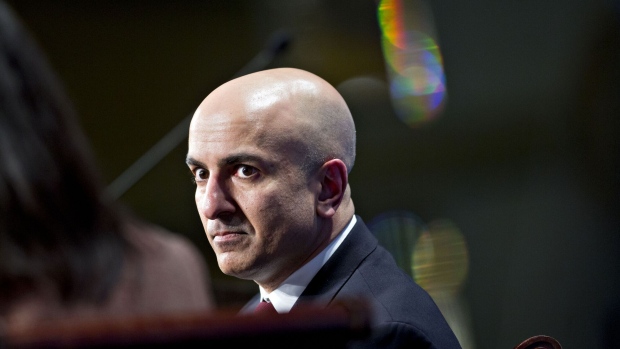Nov 7, 2023
Kashkari Says Fed Inflation Fight Not Over, to Do More If Needed
, Bloomberg News

(Bloomberg) -- Federal Reserve officials are still trying to assess whether a run-up in long-term Treasury yields will help cool the economy enough to curtail the need for more interest-rate increases.
Several of the US central bank’s more hawkish policymakers, speaking Tuesday, signaled that the cumulative tightening of financial conditions since July — with yields on 10-year Treasury bonds up more than 100 basis points — could have a dampening effect on the economy, though they want more time to see if it will last.
“We’ve seen some welcome progress with respect to inflation, but inflation still remains too high,” Dallas Fed President Lorie Logan said at a conference in Kansas City. “For me, the core question is whether financial conditions that we’re seeing today are sufficiently restrictive to return inflation to 2% in both a timely and sustainable way.”
Fed Governor Christopher Waller, in a speech in St. Louis, called the run-up in yields an “earthquake” for the bond market, while Governor Michelle Bowman told the Ohio Bankers League it was too soon for officials to know what the full effects of the recent rise will be.
The central bank last week left its benchmark interest rate unchanged at a 22-year high of 5.25% to 5.5%, marking the second straight policy meeting without an increase. Fed Chair Jerome Powell hinted officials may be done raising rates, citing the rise in Treasury yields as a potential factor.
Since then, yields have come down somewhat amid investor optimism that the Fed might be done tightening.
“I’ll be watching to see whether that continues and what that means for the implications of policy,” Logan said.
Fed officials have said that part of the debate comes down to whether yields have moved higher because of a stronger economic outlook or because investors are demanding extra compensation to hold the debt. Estimates of the component of yields representing such compensation are often referred to in bond-market circles as the “term premium.”
Minneapolis Fed President Neel Kashkari, speaking in a Bloomberg Television interview earlier Tuesday, said assessing Treasury moves was complicated, and joked that the term premium is economists’ version of “dark matter.”
“It’s the residual of all the stuff we can’t explain,” he said. “It’s not that our models are wrong, it’s the dark matter that’s out there.”
Kashkari argued a number of factors could be driving up yields, and said he’s not yet comfortable about definitively saying which one is more at play in the current environment.
--With assistance from Michael McKee, Lisa Abramowicz, Jonathan Ferro, Ana Monteiro and Scott Lanman.
©2023 Bloomberg L.P.






